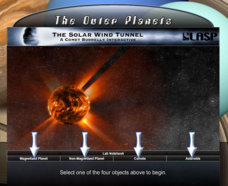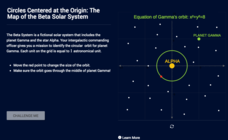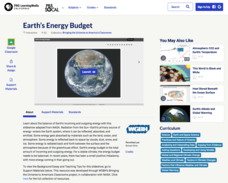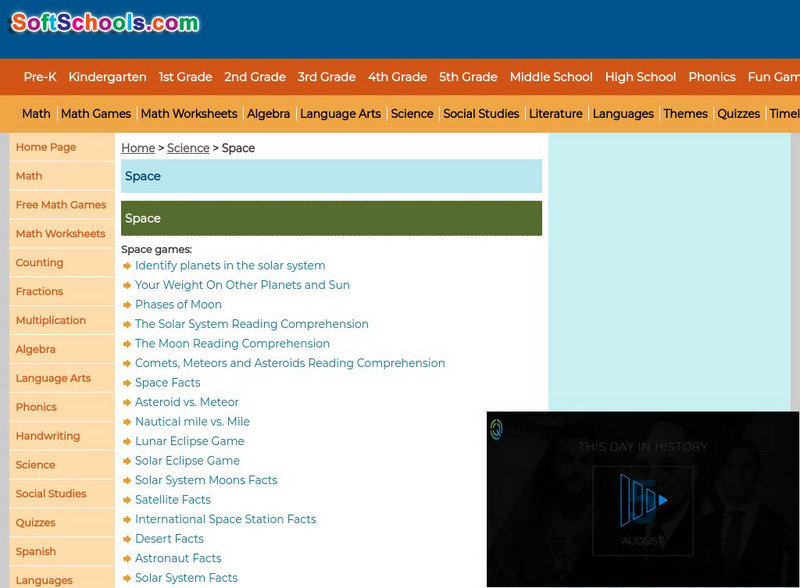CK-12 Foundation
Venn Diagrams: Planets and Dwarf Planets of the Solar System
Yes, Venn diagrams are helpful in science, too. Learners use an interactive to classify celestial bodies as having moons, as dwarf plants, as both, or as neither. They answer a set of challenge questions based on the Venn diagrams they...
American Museum of Natural History
Planetary Mysteries
Get to know our little part of the vast universe. Learners read about the common and not-so-common facts about each of the planets in the solar system. The interactive lesson includes a large amount of information as well as a quiz to...
Laboratory for Atmospheric and Space Physics
Orbit Simulator
Researchers think they have evidence of a new planet deep in our solar system that is the size of Neptune and orbits the sun far beyond Pluto. The orbit simulator shows the orbits of our well-known planets, as well as Pluto and the comet...
Laboratory for Atmospheric and Space Physics
The Solar Wind Tunnel
The winds of change are blowing in our very own solar system! But what makes some heavenly bodies more affected by solar winds than others? Pupils discover the concept of magnetic forces at work in space in this...
CK-12 Foundation
Circles Centered at the Origin: The Map of the Beta Solar System
Calculate galactic orbits in a far-out resource. Pupils drag a point on a circle to graph the orbit of a fictional planet. Using the equation, they find points through which the orbit passes. To finish the simulation, users determine the...
PBS
Earth’s Energy Budget
Is Earth's energy flow a little off balance? Explore our energy budget using a click-through interactive. Scholars discover the many factors that move solar energy around the planet and why the system is no longer in equilibrium.
American Museum of Natural History
What is Astronomy?
Go study the universe. Pupils learn seven aspects about astronomy and astronomers. They begin to learn about constellations; distance and motion between objects; gravity; the electromagnetic spectrum; dark matter and energy; and teams of...
American Museum of Natural History
What Do You Know About Stars?
Illuminate the information about stars. Pupils respond to 10 multiple choice questions about stars. The questions cover topics such as the size of the Milky Way Galaxy, the Sun, and the life cycle of a star. The resource works as a...
Curated OER
Exploring Jupiter: Galileo Curriculum Module Issue One
In this exploring Jupiter: Galileo Curriculum Module issue one worksheet, students complete a crossword puzzle that tests their knowledge of Jupiter; their are 11 links to other worksheets to explore the planet.
Curated OER
Astronomy: Prepositions Quiz- ESL
In this preposition quiz learning exercise, students select the preposition that correctly completes a sentence. Students may click on an "answer" button for immediate feedback. A reference web site is given for additional activities.
Curated OER
Cosmic Collision
In this cosmic collision activity, students explore interactive online website to study about the dynamics of different galaxies. They write short answers to 8 questions that follow.
Soft Schools
Soft Schools: Space: Solar System Interactives
Identify the planets in our solar system and discover how much you weigh on another planet with these space interactives.
American Museum of Natural History
American Museum of Natural History: Ology: Cosmic Cookies
Roll your mouse over the planets in our solar system to read a vignette about each. Then, link to the recipe for directions to create miniature planet cookies that look like the real thing.
ABCya
Ab Cya: Orbital Order
Launch into space with Orbital Order! Amplify your knowledge of the Sun and the planets of our Solar System in this astronomical activity. Do you have what it takes to put the planets back in order?
PBS
Pbs Learning Media: Your Weight on Other Worlds
This interactive resource from the Exploratorium calculates your weight on other bodies in our solar system and offers an explanation of mass and weight and the relationship between gravity, mass, and distance.
NASA
Nasa: The Space Place: Looking for Water Everywhere!
NASA has discovered water in space. This interactive resource allows you to examine the different planets and moons in our solar system to find out where their water is located.
Quia
Quia: Luna and Beyond (Quiz)
A series of questions about the moons of our Solar System is presented in a millionaire game format.















